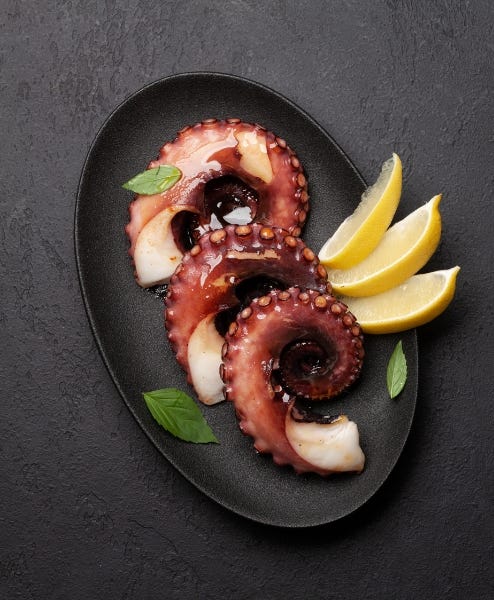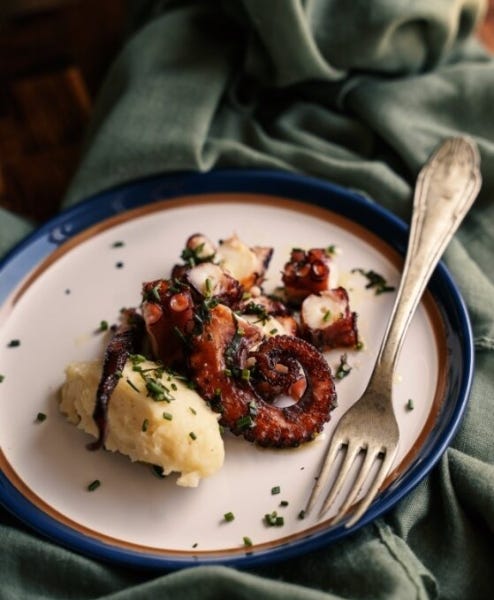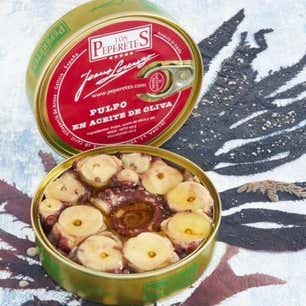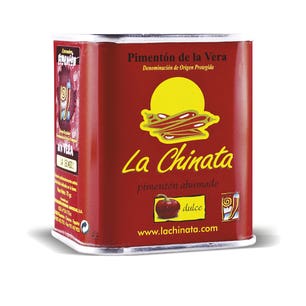Discovering Octopus
SEAFOOD
The Octopus: Nature's Marvel
The octopus, a soft-bodied mollusk belonging to the cephalopod class, is one of the most intriguing and intelligent creatures in the marine world. With its bulbous head, large eyes, and eight long, sucker-covered arms, the octopus is both a marvel of evolution and a testament to the wonders of the deep.
Octopuses vary in size, from the tiny octopuses that can fit on the tip of your finger to the giant Pacific octopus, which can span up to 20 feet from arm tip to arm tip. Their soft bodies allow them to squeeze through tight spaces, making them adept escape artists. This ability is particularly useful when evading predators or hunting for prey in crevices.
One of the most remarkable features of the octopus is its ability to change skin color and texture in an instant. This rapid transformation is not just for camouflage; it's also a form of communication. When threatened, some species can perform a startling display, flashing bright colors to ward off potential predators.
In addition to their color-changing abilities, octopuses have a few other defense mechanisms. They can eject a cloud of black ink to obscure a predator's view, allowing them to make a quick escape. Their beak, the only hard part of their body, can deliver a venomous bite.
Octopuses are renowned for their intelligence. They've been observed using tools, opening jars to get to food inside, and even escaping from their enclosures in aquariums. Their problem-solving abilities are a subject of much fascination and research.




Cooking Octopus: A Culinary Journey
Octopus, with its rich, meaty texture and subtle oceanic flavor, has long been a staple in Mediterranean, Asian, and coastal cuisines around the world. However, the key to a delectable octopus dish lies in its preparation and cooking technique. When done right, octopus can be a tender, mouthwatering delight; when rushed, it can turn rubbery and tough.
To begin, always opt for fresh octopus. Freshness ensures optimal flavor and texture. Once you have your octopus, it's crucial to clean it thoroughly. Remove the beak, eyes, and the insides, and give it a good rinse.
A traditional method to tenderize octopus, especially in Mediterranean regions, is to literally "beat" it against a hard surface, like a rock or the side of a sink. This age-old technique helps break down the meat's fibers. Freezing the octopus for 24 hours before cooking can also help tenderize the meat.
Blanching is the next step. Boil a large pot of water with a pinch of salt. Submerge the octopus into the boiling water for about 30 seconds and then immediately plunge it into a bowl of ice water. This process, repeated a couple of times, helps set the color and begins the tenderizing process.
For the main cooking, there are two primary methods: slow simmering or grilling. For simmering, place the octopus in a pot with aromatics like bay leaves, peppercorns, and garlic. Cover it with water and let it simmer gently for about 45 minutes to an hour, or until fork-tender. On the other hand, if you're grilling, marinate the pre-cooked octopus in olive oil, lemon, and herbs, then grill until charred and crispy on the outside.
Regardless of the method, the secret to perfect octopus lies in patience. Slow cooking ensures that the octopus remains tender and succulent.


Exploring Octopus Recipes from Around the World
The octopus, a versatile and flavorful seafood, has found its way into the culinary traditions of many cultures. Its tender meat and unique texture make it a favorite among seafood enthusiasts. Let's embark on a gastronomic journey, exploring five octopus recipes, each hailing from a different corner of the world.
Spain: Pulpo a la Gallega (Galician-Style Octopus)
A classic Spanish dish, Pulpo a la Gallega features boiled octopus seasoned with paprika, coarse salt, and drizzled with olive oil. Served on a wooden platter, this dish celebrates the octopus in its simplest and most flavorful form. Pair it with a glass of Albariño wine for an authentic Galician experience.
Japan: Takoyaki (Octopus Balls)
A popular street food in Japan, Takoyaki are savory dough balls filled with minced or diced octopus, tempura scraps, pickled ginger, and green onions. Cooked in a special molded pan, they're browned to perfection and typically topped with takoyaki sauce, mayonnaise, green laver (aonori), and bonito flakes.
Italy: Polpo alla Griglia (Grilled Octopus)
Italians cherish the natural flavors of their ingredients. In this dish, octopus is first tenderized by simmering and then grilled to achieve a smoky char. It's often served with a lemon wedge, fresh parsley, and a drizzle of extra virgin olive oil, capturing the essence of Italian coastal cuisine.


The Cultural Significance of Octopus in Hong Kong's Culinary Traditions
In the vibrant culinary tapestry of Hong Kong, the octopus holds a special place, weaving together strands of history, culture, and gastronomy. This marine delicacy, with its tender meat and distinctive texture, has been a staple in the region's diet for centuries, reflecting the city's deep-rooted connection to the sea. Historically, Hong Kong's coastal location made it a hub for fishermen, and the octopus, abundant in local waters, naturally found its way into the daily meals of its inhabitants.
Traditional Hong Kong recipes often celebrate the octopus in its purest form, emphasizing its natural flavors. One such preparation involves slow-cooking the octopus with traditional Chinese herbs, allowing the meat to soak up the aromatic essences and achieve a melt-in-the-mouth tenderness. Another popular method is the classic steamed octopus, often served with a light soy-based dip, where the freshness of the ingredient is paramount.
Beyond everyday meals, the octopus also plays a role in festive celebrations. During certain festivals, it's not uncommon to see street vendors offering skewered octopus tentacles, marinated and grilled to perfection, filling the air with an irresistible aroma. These tentacle skewers, with their smoky flavor and chewy texture, are a favorite among both locals and tourists, symbolizing the city's ability to blend tradition with modernity.
Buy octopus for your recipes
Longino & Cardenal
Longino & Cardenal stands today as one of Italy's leading "food globetrotters." With passion and courage it carries out a continuous search for the best raw materials, often little known to most, in order to meet the new trends in consumer behavior that seek excellent products proposed in innovative forms. All our deliveries use specialized, refrigerated couriers.









